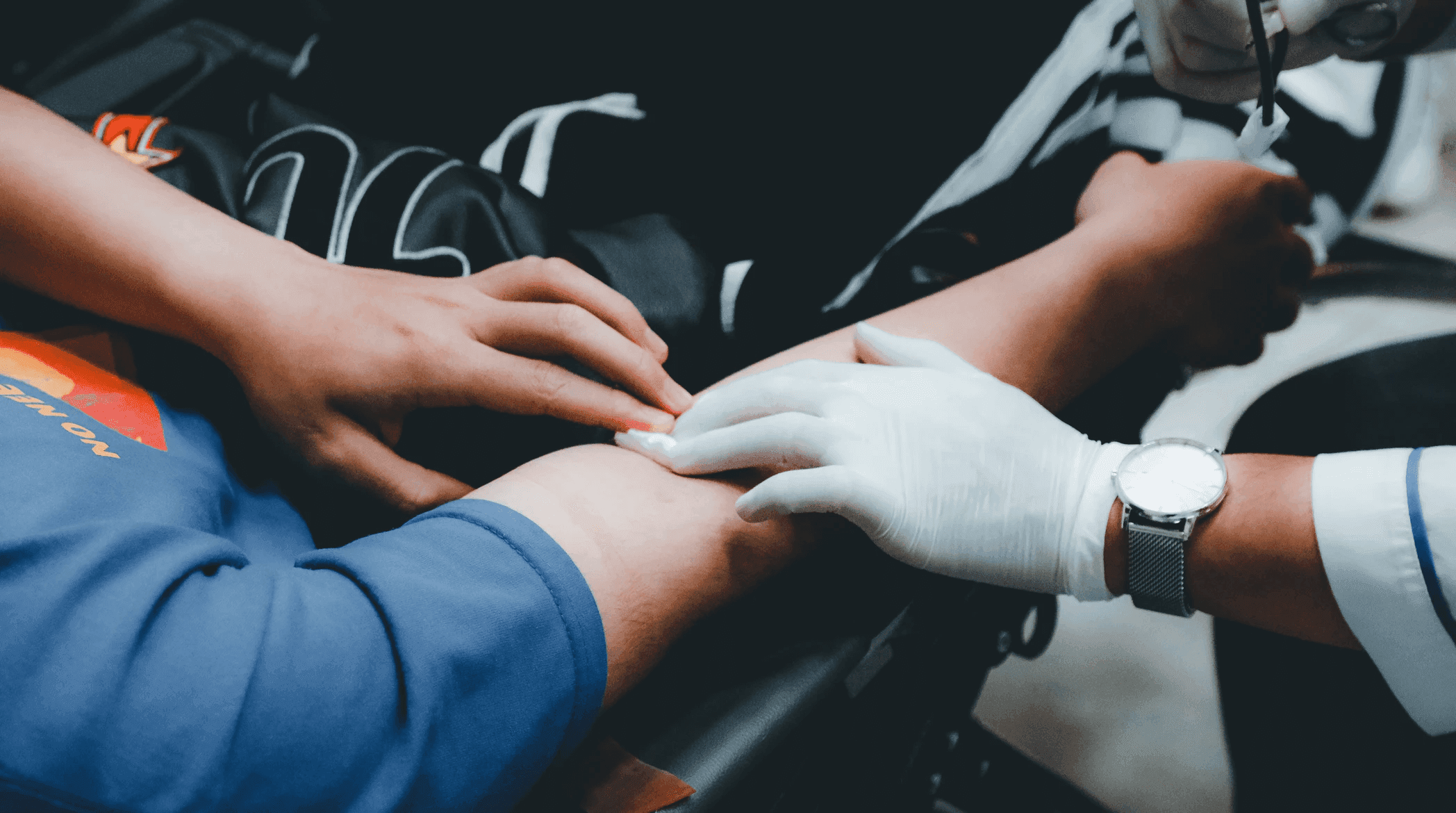



Blood Donation in Hong Kong: All You Need to Know
24th October 2025


Ever thought about donating blood in Hong Kong? In fact, a single blood donation can help three or more people as it provides different blood components to help different patients in need. Whether you are interested in becoming a new donor, or just curious about the procedure, here are the answers to all your questions about blood donation in Hong Kong.
Blood donation in Hong Kong
The Hong Kong Red Cross Blood Transfusion Service (BTS) is the only public institution that provides blood to all public and private hospitals in Hong Kong. The voluntary blood donation program was first launched in 1952 and has been managed by the Hospital Authority since 1991.
To provide some background information, in 2022, a total of 119,967 donors participated in blood donation, constituting 2% of the eligible population in Hong Kong. Of all donors in 2022, over 80% were repeat donors. At the present, the daily recruitment target set by BTS is 1,100.
How Alea can help you save on insurance
Who can donate blood?
To be eligible for a blood donation, you must:
- Be aged 16 to 66 on the day of your first donation
- Weigh over 41kg (90 pounds)
- Have not had a flu or fever in the past 14 days
For donors aged 16 to 17, parental consent is required prior to their first donation. For donors over the age of 66, if you have made a donation in the past 2 years, you can still be eligible for blood donation until your 76th birthday.
Medical history and medication
You will be temporarily deferred for about 7 days after receiving medications (including herbal medicine). Contact the donor centers for detailed recommendations on your specific situation.
If you have any chronic condition (i.e. hypertension, diabetes, high cholesterol level, etc.) and your condition is under control with no change in your medication dosage in the past 4 weeks, you may be eligible for blood donation. Nevertheless, you are recommended to consult your doctor beforehand.
If you have had any dental procedure or vaccination recently, you may be temporarily deferred from donation. People who have had a piercing, tattoo, or acupuncture within 12 months are also non-eligible for donation. It is important to note that if you suspect your blood carries a potential risk of transmitting an infection, please do not proceed with any blood donation.
All donors have to undergo a screening process by completing a health history questionnaire, hemoglobin and blood pressure check, etc. as deemed necessary by the medical staff. Before heading to a donor center, you can conduct a preliminary self-assessment online to find out about your eligibility.
What is the donated blood used for?
Fresh blood products collected from the donation program will be supplied to all public and private hospitals in Hong Kong and will be used for treatments of chronic diseases as well as surgeries following illness or accidents. Common procedures using donated blood include serious injuries from vehicle accidents, childbirth, anemia, blood disorders and cancer treatment.
After collection, the blood product will go through a series of processes including ABO blood grouping, atypical antibodies screening, infectious disease testing and blood labeling. Around 98% of the donated blood is processed into different blood components (i.e. red cells, platelets, frozen plasma and leucocytes) before being issued for clinical use.
In 2022 for example, over 60% of the blood products were used for treatments of patients aged over 60.
Where can I donate blood?
There are 10 donor centers across the territory that are open to the public. You may check their estimated waiting time on Red Cross’ official website.
Hong Kong Island
Address: 14/F, Plaza 2000, 2-4 Russell Street, Causeway Bay, Hong Kong
Opening hours: 11am–8pm
Contact: 28342084
Address: 1/F, Tung Ming Building, 40-42 Des Voeux Road C, Central, Hong Kong
Opening hours: 11am–7pm (closed on Sunday & Public Holiday)
Contact: 25261420
Address: Unit 3, G/F, Immigration Tower, 7 Gloucester Road, Wan Chai, Hong Kong
Opening hours: 10am–6pm (closed on Saturday, Sunday and Public Holiday)
Contact: 63925778
Kowloon
Address: 15/F Chow Tai Fook Centre, 580A Nathan Road, Mongkok, Kowloon
Opening hours: Monday to Saturday 11am–9:30pm / Sunday and Public Holiday 11am–7pm)
Contact: 27705930
The Hong Kong Polytechnic University Campus Blood Donor Center
Address: Integrative Health Clinic, Room AG057, Core A, PolyU Campus (located next to Fountain Square)
Opening hours: 10am–6pm (closed on Saturday, Sunday and Public Holiday)
Contact: 6392 5779
Address: 6/F, Hong Kong Red Cross Headquarters,19 Hoi Ting Road, West Kowloon
Opening hours: 9:30am–6pm (opening hour on Public Holiday will be announced)
Contact: 25077733
Address: Units 2301 & 2316, 23/F., Millennium City 5, 418 Kwun Tong Road, Kwun Tong, Kowloon
Opening hours: 11am–8pm
Contact: 31481375
New Territories
Address: 1/F, 1A, Shatin Centre Street, Shatin, New Territories
Opening hours: 11am–7pm
Contact: 26030100
Address: 8 Tai Ho Road, Tsuen Wan
Opening hours: 11am–8pm
Contact: 24142378
Address: Unit Nos. 704-705, 7/F, Yuen Long Landmark, 115-127 Yuen Long Castle Peak Road, Yuen Long
Opening hours: 11am–7pm
Contact: 24786000
Group donation
Upon appointment, a mobile collection team can be arranged for organizations or groups of at least 50 people, provided that an indoor venue (at least 800 square feet and complying with safety standards) is available. Otherwise, a group donation can be organized at any of the donor centers for any group of more than 3 people. Photography props and commemorative certificates can be provided.
What to do before donation
Make an appointment
Make use of the “eDONOR” online system to check your donation record and make an appointment in the next 30 days in any of the donor centers.
The “HK Blood” mobile app is another convenient tool for you to keep track of your donation history, book your next donation, self-assess your eligibility and receive the latest information from the Hong Kong Red Cross Blood Transfusion Service. The mobile app is available on both App Store and Google Play. Check here for user instructions.
On the day of your donation
Get enough rest the night before and drink ample water before your donation. Eat within 4 hours before donating and have a diet rich in iron, such as red meat, fish, poultry, beans, spinach and so on.
On the day of donation, wear comfortable clothes with sleeves that can roll up above your elbows. If applicable, prepare a list of your medications for the nurse’s assessment of your health history. Last but not least, remember to bring along your HKID card to verify your age.
What to expect at the donor center?
When you arrive at a donor center, you will first be asked to fill the Blood Donation Registration Form. A nurse will then perform a hemoglobin test and a health screening by taking your temperature, blood pressure and asking about your health history.
Once your eligibility is confirmed, a nurse will disinfect your skin and apply local anesthetics before performing a venepuncture. A blood sample will be taken to check your blood type and test for blood-borne diseases such as hepatitis B, hepatitis C, HIV, syphilis and human T-lymphotropic virus. For each donation, about 400 milliliters of blood will be collected and the entire process should take 7–12 minutes.
After donation, you should rest for 10–15 minutes and enjoy refreshments provided by the center to replenish your fluid loss.
After your donation
If you feel dizzy after giving blood, sit down or lie down for rest until you feel better. After a blood donation, be sure to:
- replenish your volume loss by drinking a large amount of fluid.
- have an iron-rich diet and take vitamins to replenish your iron stores.
- avoid heavy lifting and strenuous exercise within 12 hours after giving blood.
- keep the bandage on for several hours after donation.
In addition, bruising may occur near the wound but will normally disappear within 1 to 3 weeks. If you develop any signs of an infection within the next 4 weeks, for instance hepatitis, tuberculosis or malaria, seek medical help immediately and inform the Blood Transfusion Service.
How often can I donate blood?
Donors aged 16–17 can give 3 donations per year with an interval of no less than 150 days between 2 consecutive donations.
For adults, male donors can give 5 donations per year with an interval of no less than 75 days between 2 consecutive donations; while female donors can give 4 donations per year with an interval of no less than 105 days between 2 consecutive donations.
Use the blood donation calculator to check when you can schedule your next donation.
Ready to help save lives? Schedule a donation appointment at the nearest donor center to make a difference today. Find more information at the Hong Kong Red Cross Blood Transfusion Service official website or via their 24-hour hotline (2710 1234).
Looking for life or health insurance for yourself, your family or your team?
Do you already have an insurance policy? You could find a better plan!
Alea brings you choice, unbiased advice and outstanding service, with access to 100+ options from 25+ insurance companies. If you already have an insurance policy, switching insurance policies with Alea doesn’t cost you a thing.
Get free quotes with us today.
An advisor will be in touch to answer all your questions!
This article was independently written by Alea and is not sponsored. It is informative only and not intended to be a substitute for professional advice and should never be relied upon for specific advice.

